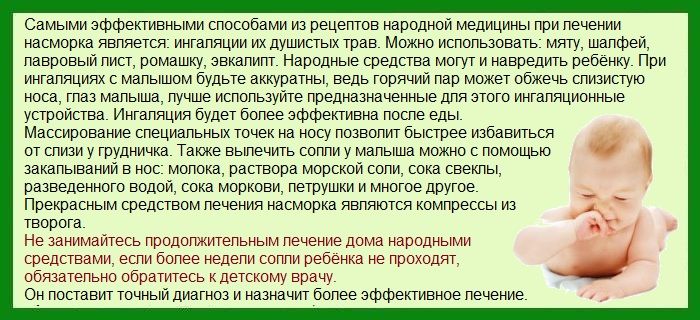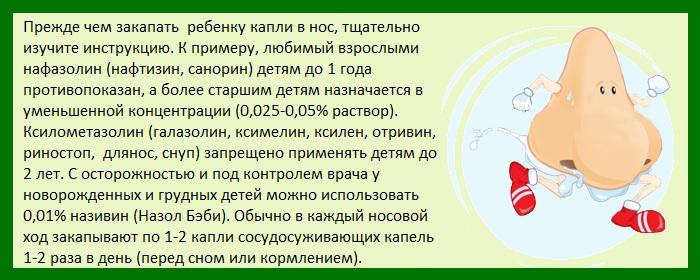How can I treat a runny nose in a baby at 3 months old?
Often the first illness in a child is a cold and its consequence is rhinitis. How to treat a runny nose in a baby for 3 months, the pediatrician usually decides. He will determine for what reason the baby has a runny nose, and will prescribe the correct and age-appropriate treatment.
Physiological rhinitis
A runny nose in infants (3 months and older) can be completely harmless and even natural, i.e. physiological. If a child is not bothered by coughing, fever and other symptoms associated with colds, if he is cheerful and eats and sleeps well, but has a runny nose, then this means that his body is simply adapting to new conditions. If parents begin to treat a physiological runny nose in a three-month-old child, there is a risk of developing allergic rhinitis. To make it easier for the child to breathe, you can simply humidify the air in the room where he is, ventilate the room more often, walk with the baby in the fresh air.
What if it's all about the cold?
Another thing is a runny nose with a cold. If the baby began to cough, he had a fever and other symptoms appeared, then it is necessary to treat a runny nose in a child. With a cold, a runny nose goes through the following stages:
- The mucous membrane swells and becomes dry, itching occurs in the nasal cavity, there is a cough and sneezing.
- There are secretions of a transparent color, breathing becomes difficult, the nose is constantly blocked.
- Puffiness subsides, the discharge turns yellow or green and becomes thicker. The child becomes easier to breathe. Dry crusts form.
If a runny nose in a child becomes protracted at 3 months, his sleep is disturbed, he does not eat well, the temperature rises above + 38ºС, you should immediately call a doctor. In addition, emergency care is needed if the child is 3 months old and has shortness of breath, if a runny nose occurs immediately after contact with the allergen, if nasal discharge has become purulent or blood has come from the nose.
How to treat a runny nose in a 3-month-old baby? Many medicines are not intended for babies, so it is not recommended to treat a runny nose in a baby on its own, even with herbal remedies. Before using anything, you should consult your doctor.
What should parents do? The room in which the baby is located should be often ventilated, air drying, dusting or overheating should not be allowed - these factors can be the causes of rhinitis in infants. If the child is on mixed or artificial feeding, then he should be given warm, clean boiled water. If the baby is naughty and refuses to eat, then there is no need to insist, but the drinking regimen should be mandatory. Water will help loosen mucus and remove toxins.
 The floor in the room should be washed with a disinfectant, but if the child is prone to allergies, then just using water is enough. You can saturate the air in the room with natural phytoncides - from time to time put a saucer with chopped garlic or onions in the room.
The floor in the room should be washed with a disinfectant, but if the child is prone to allergies, then just using water is enough. You can saturate the air in the room with natural phytoncides - from time to time put a saucer with chopped garlic or onions in the room.
The nose of a three-month-old child should be thoroughly cleaned of mucus. To do this, you can use cotton swabs or nozzle suction. If hard crusts appear in the nose, do not tear them off by force, soften them with a drop of olive or sea buckthorn oil and carefully remove them.
The main remedy for a cold in a child of 3 months is a saline solution, vasoconstrictors are also prescribed. Treatment should be aimed at eliminating the very cause of rhinitis, and all aids will help relieve symptoms and alleviate the condition of the child.
Some grandmothers advise to bury mother's milk in the nose of the child. This is absolutely impossible to do! Milk is a nutrient substance, and pathogenic bacteria on this basis will grow much faster.
Does the treatment depend on the consistency of the discharge
Transparent snot most often indicates an allergic reaction, only a specialist can help determine the allergen. The doctor will conduct tests and tell you what the baby is allergic to. There is no way to treat allergic rhinitis: until contact with the allergen is stopped, snot will appear again and again. The only thing that can be done is to facilitate nasal breathing using saline and vasoconstrictor drops.
 White snot is a signal of the end of a cold. In this case, it is necessary to clean the nasal passages. White mucus is usually thick and clogs the nose. With a tight overlap of the nasal passages, bacteria begin to multiply again, and secondary bacterial infection may occur. To avoid this, and so that the baby can breathe and suckle calmly, the mucus in the nose must be thinned. Here, again, rinsing with saline will help, Humer, Aquamaris drops will do - they need to be dripped, wait a few minutes, and then clean the nose with an aspirator.
White snot is a signal of the end of a cold. In this case, it is necessary to clean the nasal passages. White mucus is usually thick and clogs the nose. With a tight overlap of the nasal passages, bacteria begin to multiply again, and secondary bacterial infection may occur. To avoid this, and so that the baby can breathe and suckle calmly, the mucus in the nose must be thinned. Here, again, rinsing with saline will help, Humer, Aquamaris drops will do - they need to be dripped, wait a few minutes, and then clean the nose with an aspirator.
Sometimes in the mucus from the baby's nose, the mother sees blood streaks. You should not be afraid, most often this symptom does not speak of serious violations. Most likely, the blood in the nasal discharge appeared as a result of mechanical damage, for example, if you remove the snot with an aspirator. In addition, blood streaks may appear in the nozzles due to the fact that the capillaries are located too close to the surface. With a long course of an allergy or respiratory disease, the mucosa could become thinner, and this caused it to bleed.
Another cause of blood streaks may be long-term use of vasoconstrictor drugs. In this case, first of all, you need to refuse to accept them. It is necessary to lubricate the nasal passages with natural oils, use moisturizers. However, it is necessary to tell the doctor about the blood in the snot, because it does not always occur for such harmless reasons. With an increase in intracranial pressure, for example, blood is also present in the snot.
A runny nose can cause a cough
Cough may appear due to a runny nose. It is not at all necessary that the infection has entered the respiratory tract and coughing is a consequence of the inflammatory process. The point may be that the mucus from the nose flows along the back of the throat, which has many sensitive receptors, and the nasal mucus irritates them. Such a cough is called reflex, the child thus tries to get rid of mucus in the throat. It can be cured only by eliminating a runny nose.
Preparations for babies
If the child is 3 months old, then the vast majority of drugs are still contraindicated for him. How to treat a runny nose in such young children and what drugs can be used in this case, the pediatrician should know. He must also determine the dosage of the agent used.
Most often, to cope with rhinitis, vasoconstrictor drugs are prescribed, for example:
- Nazolbebi;
- Vibrocil;
- Nazivin;
- Tizin.
However, at this age, a child can be instilled with drugs that narrow blood vessels in the nose for no longer than 5 days, otherwise addiction to the drug will begin.
Widely used means, which include water and sodium chloride, for example, Salin, Otrivinbebi and the actual sodium chloride solution itself 0.9%.
Preparations based on sea water are also indicated for babies, they moisturize the mucous well and thin the secret. Recommended:
- Physiomer;
- Aqualorbaby;
- Marimer;
- Aquamaris.
The following pattern has been noticed: children under 1 year of age who are breastfed are less likely to catch a cold than artificial ones. Therefore, do not rush to tear off the baby from the breast, along with mother's milk, he strengthens and forms his immune system.
